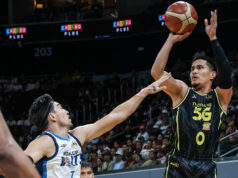For longtime hoops habitues, the narrative surrounding the Rockets-Jazz series was simple. Heading into the second-round pairing, they figured on being given a healthy dose of offense versus defense. And, needless to say, they saw the top seeds headed by presumptive Most Valuable Player James Harden with the advantage. Apart from the more obvious reasons, there was the added benefit of facing handicapped opposition; starting point guard Ricky Rubio figured to be decommissioned for the immediate future due to a hamstring injury.
Considering the way the matchup has unfolded, however, it’s clear that the Jazz have made the necessary adjustments to their game. In Rubio’s absence, they’ve moved to make their sets simpler, with their tweak predicated on pushing the pace. In other words, they’ve resolve to turn the tables on the Rockets by playing the latter’s style. And, as with just about any other adjustment head coach Quin Snyder made throughout the season, it has reaped dividends; from the second half of the opener and through all of Game Two yesterday, they’ve placed pressure on coverages by underscoring the importance of quick decisions while keeping with their egalitarian culture.
Certainly, the Jazz haven’t changed. Defense remains the foundation of their competitiveness. That said, Snyder has seen fit to highlight their core competency by maximizing his personnel’s strengths at the other end of the court. And so he has had charges moving the ball, and fast. And in halfcourt sets, he has given Rookie of the Year candidate Donovan Mitchell the responsibility to make plays off pindown screen-and-roll situations, to significant success. The development then prevents the Rockets from transitioning quickly and, in turn, affords them time to ready their counters.
As the Jazz prep for their homestand tomorrow, they can rightly point to the strides they’ve made. It isn’t just that they managed to steal a contest at the Toyota Center; it’s how they did so. And the numbers show the extent to which they’ve “out-Rocketed” the Rockets; in Game Two, they again shot better from the field, scored more fastbreak points, and had more field goals off more assists. If anything, it can be argued that they’ve been significantly better than their supposedly superior competition over the last six quarters.
Certainly, the Jazz still have much to do. The Rockets aren’t going away, and especially not with Harden — arguably the one player in the league that cannot be stopped with consistency — in the fold. Still, followers of the pro scene now know this for certain: they’re witnessing a bona fide fight that initial prognoses wrongly discounted as academic.
Anthony L. Cuaycong has been writing Courtside since BusinessWorld introduced a Sports section in 1994.



